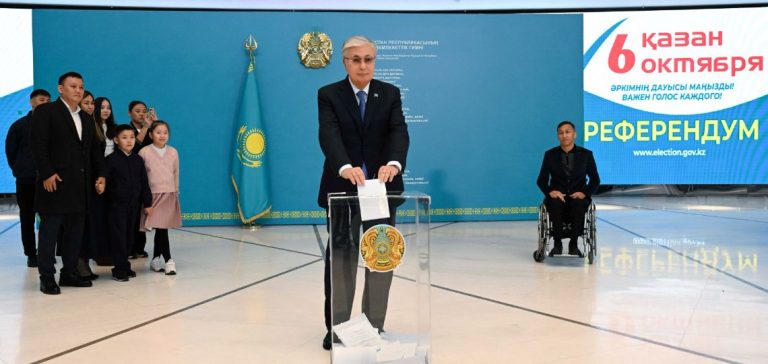Kazakhstan, the world’s leading producer of uranium, has taken a decisive step by validating, through a referendum, its intention to develop nuclear energy. According to preliminary results released by the Central Election Commission of the Republic of Kazakhstan, the turnout was 63%, with 71.12% of the 7.8 million voters responding positively to the question: “Do you agree with the construction of a nuclear power plant in Kazakhstan?”
President Kassym-Jomart Tokayev announced the organization of this referendum last year, emphasizing that the country had an urgent need for reliable and environmentally friendly energy sources. He stated that nuclear energy could largely meet the rapidly growing energy needs of the Kazakh economy but insisted that any decision regarding nuclear power must be made with the support of the population.
The Next Steps of the Nuclear Project
Following the vote, President Tokayev answered questions from the media, including those about the selection of companies responsible for building the new nuclear power plant. He explained: “This is not an easy problem. The government must analyze and conduct appropriate negotiations. In my opinion, an international consortium composed of global companies with the most advanced technologies should work in Kazakhstan.”
Kazakhstan already has limited nuclear experience, with three research reactors in operation and a Russian-designed BN-350 sodium-cooled fast reactor that operated near Aktau for 26 years before its closure in 1999. This existing experience provides a solid foundation for the future development of the nuclear sector in the country.
Objectives and Energy Strategy
For several years, Kazakhstan has been preparing a nuclear program aimed at reducing its dependence on fossil fuels, diversifying its energy basket, and decreasing its CO₂ emissions. The Kazakhstan Nuclear Power Plant (KNPP), a subsidiary of Kazakhstan’s Samruk-Kazyna National Welfare Fund JSC, was established in 2014. In addition to being designated as the owner/operator of a future plant, the KNPP is responsible for preliminary work, including a feasibility study conducted in 2018, and site location.
Although no site has been officially announced, a location in Ulken, on the shores of Lake Balkhash, has been identified as the most suitable site. The proposed first nuclear power plant would be a large reactor, but there are also options for using small modular reactors to replace retiring coal plants in the coming years. The government’s target is for nuclear to account for a 5% share of the national electricity generation mix by 2035.
Economic and Environmental Implications
The development of nuclear energy in Kazakhstan is part of a broader energy transition strategy. By diversifying its energy basket, the country aims to ensure increased energy security and attract international investments in the advanced technology sector. Furthermore, reducing reliance on fossil fuels will significantly contribute to the reduction of greenhouse gas emissions, thereby aligning Kazakhstan with international climate change mitigation objectives.
International Partnerships and Technology
Collaboration with international consortiums is essential to ensure the success of the nuclear project. These partnerships will allow Kazakhstan to benefit from the latest technologies and best practices in nuclear safety and power plant management. Additionally, international expertise will facilitate the transfer of skills and the local development of the technical capabilities necessary to support the nuclear industry in the long term.






















